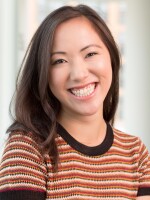
Kat Chow
Kat Chow is a reporter with NPR and a founding member of the Code Switch team. She is currently on sabbatical, working on her first book (forthcoming from Grand Central Publishing/Hachette). It's a memoir that digs into the questions about grief, race and identity that her mother's sudden death triggered when Kat was young.
For NPR, she's reported on what defines Native American identity, gentrification in New York City's Chinatown, and the aftermath of a violent hate crime. Her cultural criticism has led her on explorations of racial representation in TV, film, and theater; the post-election crisis that diversity trainers face; race and beauty standards; and gaslighting. She's an occasional fourth chair on Pop Culture Happy Hour, as well as a guest host on Slate's podcast The Waves. Her work has garnered her a national award from the Asian American Journalists Association, and she was an inaugural recipient of the Yi Dae Up fellowship at the Jack Jones Literary Arts Retreat. She has led master classes and spoken about her reporting in Amsterdam, Minneapolis, Valparaiso, Louisville, Boston and Seattle.
She's drawn to stories about race, gender and generational differences
-
The staff of a health center in New York State noticed that farm workers were struggling to get to clinics. So the staff decided to bring check-ups to them — through video.
-
1968 was a pivotal year in civil rights history. In our new project, we'll be tweeting news, articles and moments from that year as if it were all happening today.
-
Mei Lum put off grad school to take over a porcelain shop in New York City that's been in her family for five generations. But Lum wonders, how can she lay new roots without eroding what's there?
-
If you're Native American, this controversial term about your blood can affect your identity, your relationships and whether or not you can become a citizen of your tribe.
-
A listener asks: Should light-skinned Asian-Americans — like some East Asians — be able to call themselves "brown"? The answer is complicated, and has to do with how diverse "Asian-Americans" are.
-
The show's plot and very existence provoke larger questions around race, representation and casting.
-
Before Hurricane Irma hit the U.S., it devastated parts of Cuba. In extended families, Cuban-Americans are trying to put their lives back together and help their relatives in Cuba.
-
When Bao Phi was a child, there was little literature about Vietnamese refugees in the U.S. Phi hopes to change that with his new poetry book Thousand Star Hotel and a forthcoming children's book.
-
The Southern Poverty Law Center says there has been a rise in hate groups, including groups using anti-Muslim rhetoric. Some American Muslims are pushing back by running for office.
-
When you're hosting this symbol-rich holiday for the first time, how do you assume ownership of rituals you don't cherish?







